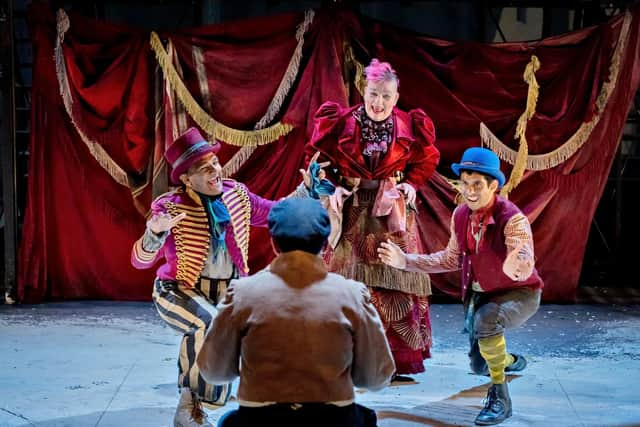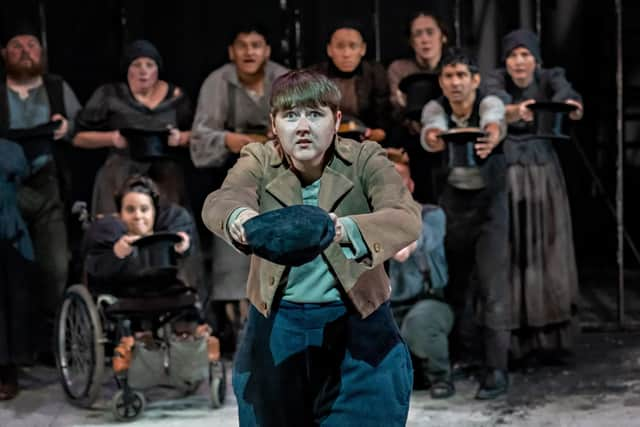Leeds Playhouse and Ramps on the Moon’s stage production of Oliver Twist can now be enjoyed as a film
Productions that people had been excited to see and that actors and directors had been excited to share, suddenly gone.
Part of the beauty of the ephemeral nature of theatre is that it happens there in the moment and if you are in the auditorium, you’re part of it, breathing the same air as the actors and if you’re not, you aren’t. It’s why there’s a greater frisson when you watch a live stream of a performance as opposed to a filmed performance that happened at some other time.
Advertisement
Hide AdAdvertisement
Hide AdBut that nature also meant the productions that were up and running when the pandemic closed the doors might have been gone forever.


One Yorkshire-born production that fell victim to this was Oliver Twist, which began its life at Leeds Playhouse and was due to springboard from there around the country on a national tour.
..
Two and a half weeks into the run of Oliver Twist, everything stopped. “For all of us involved it was so much more than just a piece of theatre. It was something that was pushing boundaries in the industry, it felt like it made us better humans, being involved in this production. When we had to close we were all sitting together and everyone was just sobbing,” says director Amy Leach.


Now, before you start to think that this is histrionics or hyperbole, you need to know that Leach, while one of the most inspiring directors I have seen at work in the region, is also one of the most pragmatic. She doesn’t deal in hyperbole. The sobbing was understandable because this was a Ramps on the Moon production.
Advertisement
Hide AdAdvertisement
Hide AdRoTM is a consortium of six theatres that have come together with the UK’s leading deaf and disabled theatre company Graeae to normalise the presence of deaf and disabled people on UK theatre stages. It’s why the company members were so heartbroken – they’re making more than theatre, they are attempting to change hearts and minds: their mission is an evangelical one.
Fortunately Ramps has a perfect evangelist in Leach, who speaks with the passion and fervour of the converted when it comes to making this kind of work.
“It has completely changed and deepened my practice as a director,” says Leach.
She describes working in this way on the Ramps on the Moon website thus: “It’s like I’ve had this paint box that I’ve made plays with for ages and I’ve just discovered there was another layer.”
Advertisement
Hide AdAdvertisement
Hide AdIt is why the release of a filmed version of Oliver Twist, the production that found itself so cruelly shuttered prematurely, means so much.
Working from a script by the highly regarded Bryony Lavery, Leach’s production featured a cast of actors who were deaf and disabled and both of those and neither, but the quietly revolutionary aspect of it was the way that access was woven into the production.
“From the moment it was commissioned the project was intended to have a number of deaf and disabled artists involved on and off the stage,” says Leach.
“And we put the access of those artists into the creative layers of the show.”
Advertisement
Hide AdAdvertisement
Hide AdOrdinarily access requirements in productions might include a BSL interpreter on stage, maybe captions, audio descriptions added to a play – here the work was done from the ground up.
“A number of our characters were deaf, so Billy Sykes, Fagin and Oliver were all deaf characters as well as actors, so sign language was built into their story. It meant we could explore within the story what the situation was for these characters living in the Victorian era, so that culture was represented in the fabric of the story, which was really important to all of us involved,” says Leach.
She really is deeply passionate about this aspect of theatre and this is a woman whose enthusiasm for her craft is impossible to ignore in the rehearsal room; when the cast gathered to restage the production for filming over the last couple of months Leach was struck by Covid and ended up directing from home via a screen.
“So the cast could see my giant head – but I think some of the BSL interpreters on the show were pleased because I tend to wave my arms around a lot when I’m directing and they didn’t have to deal with that in the room.”
Advertisement
Hide AdAdvertisement
Hide AdWhen I ask why it matters to have this kind of representation built into a production, Leach is unequivocal.
“Shouldn’t the question be why doesn’t it matter? One in five people in the UK has some sort of disability and that just isn’t represented on our stages and access isn’t considered a part of the creative process, but why not? When you think of it as a creative layer and not a chore or something you have to do, it only benefits your production,” she says.
“In theatre we are problem solvers, it’s just something we do all the time. If you have a deaf Oliver and he meets the Artful Dodger for the first time you embrace that to make some really interesting decisions and embrace the extra layers of storytelling that it gives you.”
It should come as no surprise that the filmed version is shot through with the creative solutions of the original production.
Advertisement
Hide AdAdvertisement
Hide Ad“The industry was watching the production, wanting to talk about the way we built in this stuff,” says Leach. “So to have it filmed and be able to share it with other people in theatre feels like a really important and useful thing for us to be able to do,”
Film version available on website
Filmed over three weeks with almost all the original cast involved, director Amy Leach’s filmed version of the Leeds Playhouse and Ramps on the Moon co-production of Oliver Twist is available on the Leeds Playhouse website until November 20.
Leach says she remained as close to the original theatrical production as possible to allow audiences the full live experience they were denied when the Covid-19 pandemic closed the production in March 2020.
For more information and to view the production, visit www.leedsplayhouse.org.uk/
